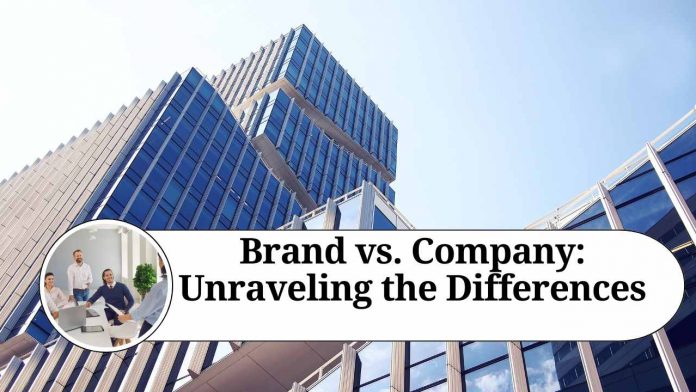Introduction
In the world of business, two terms frequently used and often intertwined are “brand” and “company.” While they are interconnected, they represent distinct aspects of an organization’s identity and operations. Understanding the difference between a brand and a company is crucial for developing effective marketing strategies, fostering customer loyalty, and achieving long-term success. In this blog, we will delve into the nuances of these terms and explore how they contribute to the overall success of businesses.
Defining a Brand: A brand is more than just a logo or a catchy tagline; it encompasses the intangible elements that differentiate a product, service, or organization from its competitors. A brand represents the emotions, values, and perceptions associated with a company, influencing how customers perceive and interact with it. It is the sum total of all the experiences, both positive and negative, that customers have had with a particular product or company.
A brand is built through consistent messaging, visual identity, customer service, and the overall quality of the product or service. It is the promise a company makes to its customers and the expectations it sets for itself. Successful brands evoke trust, inspire loyalty, and evoke an emotional connection with their target audience.
Understanding a Company: A company, on the other hand, refers to the legal entity that manufactures products, provides services, and conducts business activities. It is the organizational structure responsible for developing, producing, and selling goods or services to customers. A company typically comprises various departments, employees, physical assets, and intellectual property.
The company’s purpose is to generate revenue and maximize profits while ensuring the smooth functioning of its operations. It involves aspects such as manufacturing, distribution, finance, human resources, and legal compliance. A company sets goals, formulates strategies, and makes operational decisions to achieve its objectives.
Differentiating Factors:
- Scope: A company encompasses all aspects of the organization, including operations, employees, assets, and legal structure. A brand, however, focuses on the perception, reputation, and emotional connection that customers have with the company.
- Tangibility: A company is tangible and can be physically identified through its physical assets, offices, factories, and employees. Conversely, a brand is intangible and exists in the minds of customers as a set of beliefs, associations, and experiences.
- Customer Perception: A company’s reputation and success are heavily influenced by the perception of its brand. Customers form opinions and make purchasing decisions based on their experience with the brand, its messaging, and its alignment with their values.
- Longevity: While a company may undergo changes, rebranding, or even mergers and acquisitions, the brand often endures. Brands can outlive individual products or even the existence of a specific company, representing a lasting legacy that resonates with customers.
Conclusion
In summary, a company is the organizational structure responsible for business operations, while a brand encompasses the emotional connection, perception, and reputation associated with the company. While a company focuses on operational aspects, a brand focuses on customer experience, trust-building, and differentiation from competitors. By understanding the differences between a brand and a company, businesses can develop effective strategies to build strong brands, foster customer loyalty, and achieve long-term success in today’s competitive marketplace.
Other Related Blogs: Section 144B Income Tax Act
Frequently Asked Questions (FAQs)
Q. What is the difference between a brand and a company?
A brand represents the intangible aspects of a company, such as its values, reputation, and customer perception, while a company refers to the tangible aspects, including the organizational structure, physical assets, and operational activities.
Q. How does a brand differ from a company’s logo or visual identity?
While a logo or visual identity is a part of a brand’s visual representation, a brand encompasses much more. It includes the emotional connection, customer experiences, messaging, and overall perception associated with the company, extending beyond its visual elements.
Q. Can a brand exist without a company?
In most cases, a brand is closely tied to a company. However, in certain situations such as licensing or franchising, a brand can be associated with multiple companies. Additionally, a brand can outlive a company if it continues to resonate with customers even after the company ceases to exist.
Q. How does a company impact its brand?
A company’s actions, products, services, and customer interactions directly influence its brand. The company’s reputation, quality of offerings, customer service, and overall customer experience shape the perceptions and emotions associated with the brand.
Q. Can a company change its brand?
Yes, a company can rebrand by altering its brand strategy, visual identity, messaging, or target audience. Rebranding is often done to adapt to market changes, shift company focus, or revitalize a brand that has become outdated or stagnant.
Q. Which one is more important for business success: brand or company?
Both a strong brand and a well-functioning company are vital for business success. A company ensures efficient operations, financial success, and the delivery of products or services. A brand, on the other hand, differentiates the company from competitors, builds customer loyalty, and influences purchasing decisions.
Q. How can a company build a strong brand?
Building a strong brand involves consistent messaging, aligning brand values with customer expectations, delivering exceptional customer experiences, maintaining a distinct visual identity, and effectively communicating the brand’s story and unique selling propositions.
Q. Can a company have multiple brands?
Yes, a company can have multiple brands. This strategy is often employed to target different customer segments, enter new markets, or offer a range of products or services catering to diverse customer needs.
Q. What role does a brand play in customer loyalty?
A brand plays a crucial role in fostering customer loyalty. A strong brand that consistently delivers on its promises, provides a positive customer experience, and aligns with customer values can create a deep emotional connection with customers, leading to increased loyalty and advocacy.
Q. How does a company’s brand affect its market position?
A well-established brand that is trusted, recognized, and associated with positive attributes can help a company differentiate itself from competitors, establish a unique market position, and command a premium price for its products or services.




















